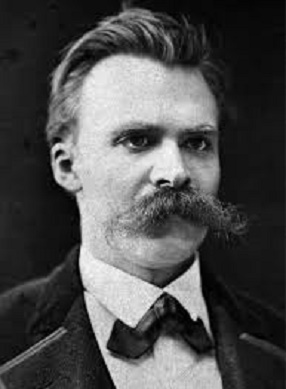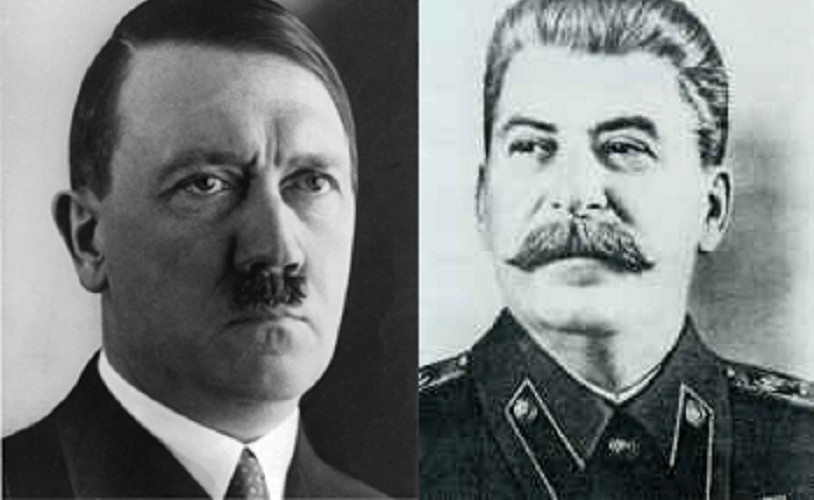Given that I have compared the Indian left-wing thinking with the fragmentary and deceptive asuric forces, it is only a matter of time that an article or commentary comparing my writings with Fascism will appear. Therefore, it is imperative that we understand some characteristics of Fascism so that we educate ourselves regarding the nuances involved.
What is specifically important to understand here is that the asuric forces since the times of the Fascists and Nazis have taken the spiritual discourse of the dharma traditions—primarily Vedanta and Buddhism—and inverted them on its head. A superficial examination of the fascist discourse will show similarities with the cosmology (worldview or paradigm) and epistemology of the dharma traditions but a deeper examination will reveal issues exactly in the reverse—just like the Nazi swastika, which is an inverted form of the Dharma swastika.
Fascism began by appropriating the denunciation of rationality and reason. It was a reaction against Enlightenment and Positivism. Very briefly, Enlightenment was the movement, which emerged at the culmination of Renaissance in Europe. It privileged science and reason, and held that the panacea of all ills facing humankind was through science and through pursuit of pure reason. Positivism is that aspect of science, which holds that only that phenomenon is real and worth investigating, which can be accessed through the five senses.
 The Fascists appropriated the writings of some of the leading intellectuals of the age or preceding it for their purpose. The first and foremost thinker—and the most crucial one at that—which comes to my mind serving the fascist agenda was Nietzsche. Nietzsche’s anti-science stand is clear from his numerous aphorisms in the Gay Science. Critiquing that reason produces herd mentality, he attacked Enlightenment, favoring instinct over reason. Disputing Kant that it is through the use of pure reason on which we should base our morality, Nietzsche favored sound instinct for the pursuit of morals. In the scheme of Nietzsche, irrationality and instinct had the upper hand as opposed to rationality. And what is important to know is that Nietzsche was an ardent student of the dharma traditions—more of Buddhism and less of Vedanta however.
The Fascists appropriated the writings of some of the leading intellectuals of the age or preceding it for their purpose. The first and foremost thinker—and the most crucial one at that—which comes to my mind serving the fascist agenda was Nietzsche. Nietzsche’s anti-science stand is clear from his numerous aphorisms in the Gay Science. Critiquing that reason produces herd mentality, he attacked Enlightenment, favoring instinct over reason. Disputing Kant that it is through the use of pure reason on which we should base our morality, Nietzsche favored sound instinct for the pursuit of morals. In the scheme of Nietzsche, irrationality and instinct had the upper hand as opposed to rationality. And what is important to know is that Nietzsche was an ardent student of the dharma traditions—more of Buddhism and less of Vedanta however.
Mussolini, a great Marxist in his own right, incorporated these ideas of Nietzsche and Fascism was born.When one compares the above with respect to what I write in my earlier article, “Opposing the Left is not ‘Right,’” I am sure that someone in the Indian Left will begin jumping up and down, shouting that they have found another one from the dharma camp promoting fascism, for I write:
“Now before my detractors begin calling me obscurantist and superstitious, let me tell them straight away: I do not hold the puranas as myths, and do not put them in the category of mythology as described in western literature. This is because I do not think that the western framework, which operates in the paradigm of positivism and logical positivism (which states that only that is real and worth investigating is which can be perceived by five senses) and rationalism (which privileges mind, reason, and logic as the ultimate instruments for knowledge pursuit), can really do any justice to the investigation of reality or superstition of these matters.
This is primarily also because the very epistemology (theory of knowledge) and methodology behind the framework which has given birth to puranic literature states that there is a profound realm of knowledge, which cannot be accessed through five senses, emotions, or mind. This realm of knowledge is however scientific, though not in the positivistic sense, and it can be accessed through subtle senses that are behind our gross senses. This realm of knowledge is verifiable and reproducible, and that is why yogis across the ages in India have underlined the existence and reality of these subtle and invisible realms. These realms that are behind the manifest can be accessed and known by anyone who engages in spiritual and yogic practices.”
On the surface, my discourse and Nietzche’s discourse will look the same but these similarities have the same connection that dharma swastika has with Nazi swastika: look the same superficially but completely inverted when one looks closely. It is true that all the dharma traditions of the Sanatana Dharma—Vedanta, Buddhism, and Jainism—have extensive discourse on the transcendence of mind and senses for the realization of yogic (or to use the common parlance mystical or spiritual) reality but this discourse categorically states that the yogic reality is beyond mind, reason, and logic.
It is trans mind (with reason and logic as its instruments) and senses, and not infra mind and senses. The reality is above the mind, not below the mind where instinct and irrationality are. Yogis after deconstructing and deconditioning the mind go into the realms of higher mind whereas Mussolini and Nietzsche devolve and come down to instincts and irrationality. For the yogi, trans-rationality is the pursuit whereas for a fascist irrationality or infra-rationality is the pursuit. And this is a crucial difference to know and note.
Going beyond the mind, a genuine yogi becomes the paragon of love, affection, and compassion. For him or her, the whole world becomes his or her family through which he or she embraces unity in diversity, without privileging unity to make it homogeneous or monolithic. Devolving below the mind, an individual becomes a hard-hearted asura for whom war, suffering, murder, pillage, killing, and rape become a sport.
By inverting the dharmic discourse and using it for the most nefarious of purposes, the asura has been sitting over the treasure trove of dharmic spirituality which comes from the “ancient” and “medieval” times.
In Indian academia today, the moment one utters the word dharma scholarship—as my earlier article showed—the left-wing and left-wing supporters begin putting the fascist tag on him or her. But the reality is that Marxism—the father of the Indian Left wing thinking—is extremely close to Fascism, and is as distant as it can be from any cosmology coming from the dharma traditions. Fascism grew out of Marxism. In fact, it is hand in glove with Marxism.
Georges Valois called Georges Sorel the “intellectual father of Fascism” and Mussolini agreed that whatever he was he was because of Sorel. Sorel returned the compliment by saying that Mussolini was the greatest of all the statesman of his day. Now Sorel was an ardent Marxist in the early years of his intellectual commitments, holding every word in the Communist Manifesto as the gospel of Truth.
Because the paucity of space will not allow me to go into the full details of the Communist Manifesto, let us focus on some of the essentials of Marxism that defined the out-growth of Fascism: revolutionary action for the creation of a classless society, and the creation of rational future from the irrational present. It was the irrational present and the use of revolutionary violence for the future society that caught the imagination of the Fascists. Sorel was writing in the times of Freud, who was contending for the presence of unconscious and irrational id as motivations for a good part of the human behavior.
And there was also Gustave Le Bon, who argued that human beings come under the influence of the irrational when incited in a crowd. In other words, in a crowd the collective behavior of human beings is primarily guided by the irrational, instinct, and sentiments as opposed to the rational. This also meant that crowd could be influenced through the use of images and slogans under the guidance of a powerful leader. Sorel paid heed. For any future desired by a leader who could influence a crowd or mass for revolutionary action or war, he recommended the exploitation of the existing irrational that Marx had acknowledged.
Since a revolution cannot happen without a powerful and forceful leader, it was only natural that Fascism promoted the idea of a strong leader—a space which was soon taken up by Mussolini, who himself was an ardent Marxist not too long before he turned into a Fascist. And a bit of tinkering with Marx’s emphasis on reason for the rational society of the future (not the present, for in the present the emphasis was on irrational) and substituting it with will to power, instinct, and vital, the demon of Fascism was ready to take on war and violence! But the tinkering is causal: Think about it—revolutions cannot happen without the will-to-power, strong instinct, and vital. It was only a natural consequence that will-to-power, instinct, and vital came into focus in Fascism.
Again for a revolution, action is necessary which cannot be accomplished by people absorbed in thought, intellect, thinking, and intellectualism because of which Fascism was extremely action-oriented and anti-intellectual. This emphasis of Fascism does not distinguish it from Marxism but makes it a natural corollary of Marxism.
Classless society of Marxism turned into State and Nation in the Fascist imagination where all differences among individuals were obliterated—a nation or state in fascist imagination was one homogeneous unit with every individual appended to it. Wasn’t Marxism promoting the idea of a homogenous classless society; so why should we be surprised that the Fascists substituted this category with a homogenous Nation State?
And in order to maintain a classless society, once the utopia has been achieved, a Marxist has to continually engage in a revolution—he or she will remain in a perpetual state of revolution, forced to make revolution after revolution—because of which he or she is not much different from a Fascist who promotes a state of perpetual war.
There are some authors who try to distinguish Marxism from Fascism by stating that because the latter emphasized leadership, authority, instinct, will to power, Nation State, war, anti-intellectualism, and action that it is dissimilar from the former. But as we see in the above, Marxism and Fascism are two faces of the same coin—one follows the other. This is primarily the reason why Marxism has given birth to Fascism or its equivalent more often than not in history.
It is in no time that the ideology gives birth to totalitarianism. We have already seen what happened in Soviet Union and the Eastern Block when it came to basic human rights, democracy, and freedom of speech. Stalin is known to have put 14 million people in Gulag out of which 1.4 million died. This was in addition to the close to a million people who were executed through judicial murders.
Another one was the Romanian dictator Nicolai Ceausescu, who was the General Secretary of the Romanian Communist party from 1965 to 1989. He began as a moderate but soon turned totalitarian along the Stalinist lines, exercising strict media control and not tolerating dissent. The secret police under his command, the Securitate, was one of the most oppressive and brutal secret police force ever.
Pol Pot is another example that comes to my mind: he was the General Secretary of the Communist party of Kampuchea from 1963 to 1981. He became the premier of Cambodia in 1975 and soon after unleashed a totalitarian regime, which wiped off twenty five percent of the population of Cambodia. There are many others who can be added to the list.
It is time that the Left intellectuals in India inquire within, and stop yelling fascism the moment they encounter a scrutiny of their writings and ideology, particularly when it comes from the dharmic traditions. I am convinced that they do this consciously or unconsciously to deflect the gaze onto someone other or outside. This is a strategy to hide from an inquiring gaze. Projecting it onto the “other” is master craft that these forces of ignorance (avidya) and evil have mastered.
Given that the asuric forces operate through outright evil and ignorance (avidya), I do not think that this article will make any change to the thinking of the evil ones but my appeal is to others, who have not thought critically through the pedagogy and politics of the Indian Left. There is a treasure of inner, outer, and social transformation within the dharma traditions, which has been obfuscated from the eyes of the Indian students and Indian academics.
The treasure needs to be shown the light; the treasure must come into academia and universities. The ignorance of this treasure trove will only add to the misery of the Indian people, and with every passing day things are not looking up as far as reduction of misery in the Indian society is concerned—reduction in poverty does not necessarily add up to reduction in misery.
In conclusion, I want to add that the government owes this to the Indian people: Without making any changes to the current educational system or curriculum, the government needs to create institutions of eminence where scholars interested in researching, exploring, knowing, and developing Indology according to the epistemology and ontology of the dharmic and other spiritual traditions.
As this field will grow, they will debate and engage the scholars from the Left, which will allow the truth to see the light. Will the Left allow it? Knowing now the kind of forces that they represent, it will not be an easy ride. But if we really care for our civilization, for the future of this country, it must happen otherwise the unchecked Left scholarship will slowly and gradually break the country apart.
A former Core Faculty at Sofia University, Palo Alto, California, Kundan Singh, PhD is currently a core doctoral faculty at the Hindu University of America where he is engaged in developing a completely new field in academia, Postcolonial Hindu Studies: https://www.hua.edu/academics/areas-of-study/post-colonial-hindu-studies/
He is also the Vice President of the Cultural Integration Fellowship in San Francisco and Senior Fellow at Hindupedia, Cupertino, California where he is diligently involved with changing the representation of Hinduism and India in grade-school textbooks in California and across the US. Author of the Evolution of Integral Yoga: Sri Aurobindo, Sri Ramakrishna, and Swami Vivekananda and numerous book chapters in edited books, and joint author of Making Children Hinduphobic: A Critical Review of McGraw Hill’s World History Textbooks with Krishna Maheshwari, he has lectured extensively in San Francisco Bay Area and has many academic presentations at international and national conferences to his name.


